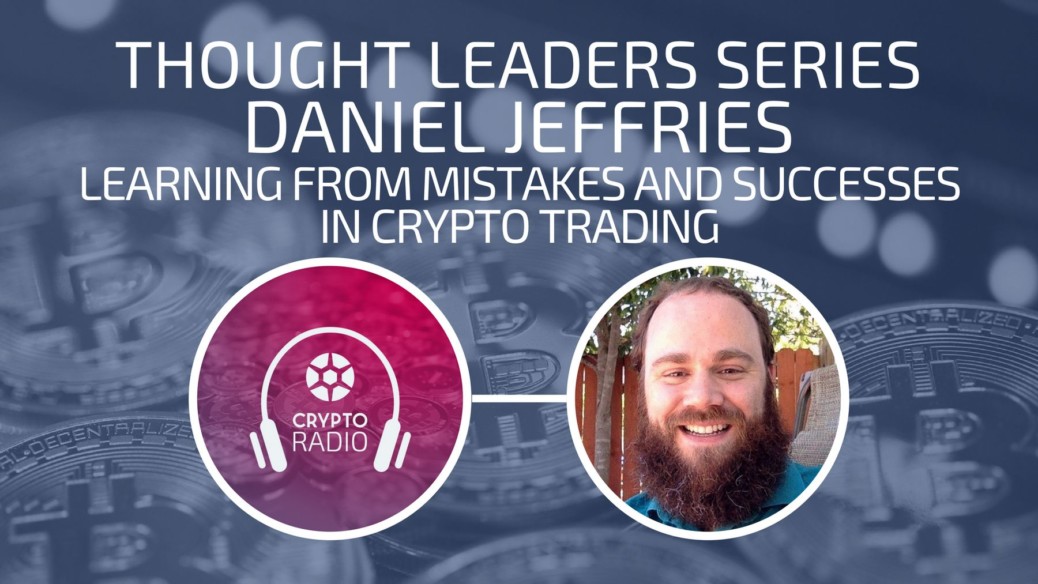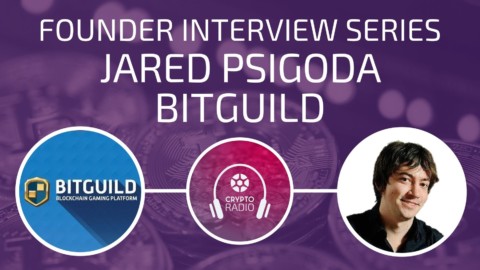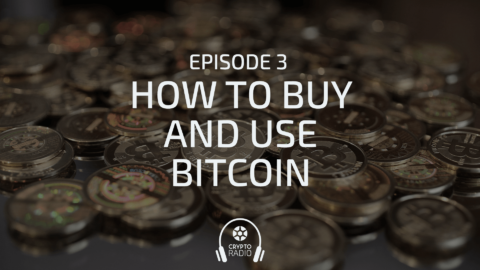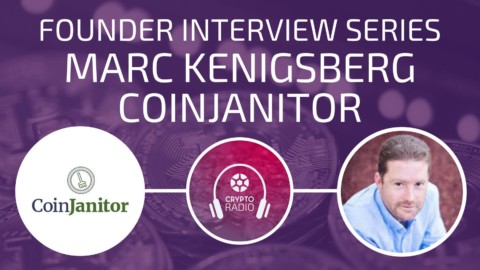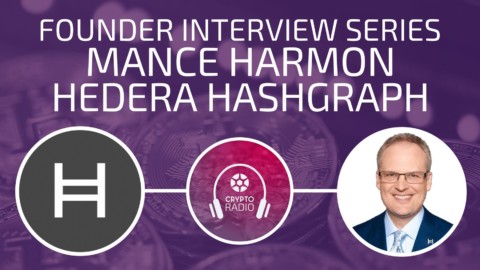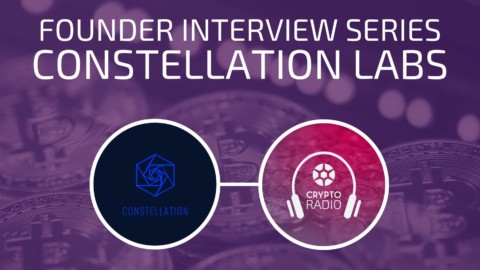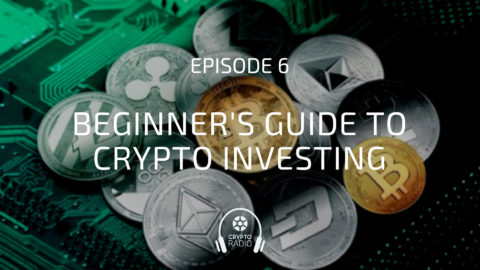Podcast: Play in new window | Download
Euvie: Hi everyone, I’m your host Euvie Ivanova. Welcome to part two of our interview with Daniel Jeffries. In this episode we talk about the biggest mistakes that Daniel has made as a crypto trader and the most important things he learned from the most successful traders out there. To get the show notes from this episode go to cryptoradio.io/daniel2. If you haven’t heard the first part of this interview, go to cryptoradio.io/daniel1. The next part of this interview will be available at [00:00:30] cryptoradio.io/daniel3.
This episode is brought to you by bitguild.io. Bitguild is a new gaming platform built using blockchain technology. Their mission is to redefine the relationship between gamers and game developers. On the Bitguild platform, gamers maintain full ownership and control of their virtual items, which are stored on the blockchain. They can transfer items and progress between compatible games and they can make in game transactions safely and cheaply, and sometimes free. Developers who join the platform will get [00:01:00] a direct link to an established player base, a strong community, and a network of like minded developers building on the same platform.
Developers will also have the potential for direct game development funding from Bitguild. The first version of the Bitguild portal is now live. You can login with Meta Mask, buy the Plat token, and play Bitguild’s first game, Ether Online. They now have a full inventory wallet system for in game items. In the coming weeks, the marketplace will be implemented and several independent developers are joining the site [00:01:30] to bring their unique games to the Bitguild family. Go to cryptoradio.io/play to start playing and join the Bitguild official Discord server to connect with the team.
Mike: Welcome to Crypto Radio. We interview the top thinkers and entrepreneurs in the blockchain and cryptocurrency industry. We also cover topics like trading, investing, and ICOs. We’re your hosts Mike Gilliland, Michael Paul, Chris Sparks, and Euvie Ivanova. We’re entrepreneurs, crypto investors, and co-founders of a new blockchain investment platform [00:02:00] called cosyndicate.io. We created Cosyndicate and Crypto Radio to make crypto investing a better experience for you. If you’re new to the show and you’d like a list of our top episodes and resources, go to cryptoradio.io/start.
If you like our podcast, you can subscribe, share, and follow us on social media and leave us a rating and review on iTunes and elsewhere. It helps others find the show and we really appreciate it. You can find all those links at cryptoradio.io/start.
Euvie: [00:02:30] What have been some of your biggest failures or some of your biggest hard learnt lessons in trading?
Daniel: I’ve got a number of them. I would say in the early days of trading the regular stock markets, getting involved with triple ETFs, particularly around precious metals and financial stocks during the dot com go go days. It was a total disaster for me. I was getting eaten alive [00:03:00] by fees, I was buying and trading them on a complete whim thinking that I understood which way the wind was blowing. I really had absolutely no idea what I was doing. It was interesting that I didn’t have a lot of money then and it was actually just after the dot com crashed that this was happening. I was trading, so I was subject to the pattern day trader rule that had come in to affect after the crash of the dot coms.
That rule was designed to make sure that, if you had less than $25,000 in the market, [00:03:30] you could not do more than three-day trades in a month. I remember being furious about the rule because I thought, “This is my money, I know what I’m doing and I can make these decisions.” In fact, I had actually no idea what I was doing. I probably would have lost all of the little money that I had in the market. I still, in many ways, don’t agree with the rule. I do, however, understand the spirit of the rule. I do agree with the spirit of the rule. [00:04:00] What they were trying to do is say, “Look, if you don’t know what you’re doing, if you’re a novice, take a pause. Don’t go crazy, don’t try to day trade all the time.”
Unfortunately, you can’t really make a rule like that, there’s no characteristic that you can lock into that says somebody is a novice or not, there’s no test you can give them or whatever. What they do is they settle for this half-assed hack which is, “Okay, if you have a lot of money, you must know what you’re doing. If you don’t have a lot of money, [00:04:30] you don’t know what you’re doing.” Of course, that’s not true. I know many rich people who have no idea what they’re doing, and many poor folks who know exactly what they’re doing. Or, we’d never have any bankruptcies. However, I still agree with the spirit of the rule and I really didn’t know what the hell I was doing.
After I made more money, I made other types of terrible mistakes. Getting a sense of doom, you get this sense of doom about the marketplace. You watch too much of the news – I no longer watch any news. I think it’s, in many ways, just the [00:05:00] way to be afraid all the time. If there’s something really important that I need to know, it’ll find me, it’s really not hard. I just have taken a permanent news fast – although occasionally something comes across my feed that I see. I try not to pay attention but you always see these doom and gloomers in the market. Somebody’s always predicting the end of the stock market and, of course, a stopped clock has the right time twice a day. A boring squirrel will find a nut every once in a while.
Eventually, one of these guys is right and they go, “What a genius. [00:05:30] The market crashed right after he said it.” Except he said 25 times. It’s like those guys that predict the end of the world, they’re like, “It’s on June 12th this year,” then June 12th comes and they’re like, “I read the scriptures wrong. I didn’t have the [inaudible [0:05:44] records down. It’s actually August 36th. Yeah, but there will be when the cosmic calendar…” It’s nonsense, right? I’ve had a couple moments like that where I just pulled all my money out, I was sure doom and gloom… [00:06:00] I’ve gotten a lot better with it and settled with it.
There have been times where I have actually seen a market crash coming but it has been more of an understanding of my indicators than just the sense of, “The wind is turning, nuclear annihilation is coming and the markets will crash.” That kind of nonsense. I would say probably the worst trade I ever made was just FOMOing into Neo, when it was on its rocket ride. I remember it just [00:06:30] rocketing up and then I just watched it crash and burn away all of my money. I just could not let it go. It was one of the first times that that had ever happened to me. That was one where I just couldn’t let it go. I just watched it burn up money. The more it burned, the more I held.
It was a painful lesson to learn. I’ve talked about that in some of my articles and I remember somebody posted, someone in the comments, they said, “Ironically, if you had just held on even longer, it would have come back and then some.” I’m like, “[00:07:00] That is not a trading strategy, that is bullshit. That is 20/20 hindsight in action, that is not how the fucking world works. Nice try.” There is no guarantee that any asset comes back. There are numerous times when things go dead. Look at something like – how many projects are gone now in the crypto space, right? You go back and look at the historical snapshot of top 100 coins and they’re gone, they’re just gone.
They’re gone. [00:07:30] Anybody who thinks that you just hold it forever and it’ll automatically come back is totally delusional. In the regular markets, you look at something like [inaudible [0:07:37]. People held [inaudible [0:07:40] from $100 or $90 at its peak to 50 cents. There were people who actually sold at 50 cents. That is how delusional the human mind is when you get attached to something. That was an incredibly painful lesson and I have vowed never to make it again. I have ruthlessly tight stops, [00:08:00] I spent all my time learning portfolio management. In fact, learning when to enter and exit is completely, completely, completely to risk management and portfolio management.
Every great player eventually learns that you have got to have a clear plan to stop bleeding when things are going wrong, because they will go wrong. It’s as simple as that. You are playing a gambling game of probability and people [00:08:30] don’t want you to believe that. Every website out there will tell you it’s not gambling, it’s totally different. Sorry, the math is precisely the same. When you study the mathematics of game theory and probability and statistics of games and gambling, it is precisely the same thing. There’s a stigma attached to gambling and, obviously, there’s gambling addiction.
I don’t ever want to make light of that, it’s a serious disease and it ruins lives. The fact is that you are better off studying probability, portfolio management, [00:09:00] the mathematics behind games, and gambling to get better at trading. They are literally the same thing.
Euvie: Yeah. Psychology, as well, because when you’re competing with a bunch of other irrational monkeys, then it helps to know how irrational monkeys work.
Daniel: We are all irrational monkeys, we are all advanced monkeys and totally irrational. Actually, original game theory, the biggest problem with it and the biggest problem with early economics was that we believed that people were ideally [00:09:30] rational and always made the rational decision. That is totally insane. Nobody is rational. Nobody always makes the correct decision. There is no perfect information disclosure. Information is asymmetrically distributed and asymmetrically processed, imperfectly processed by each individual mind to the best of their ability.
To the best of most people’s ability is woefully lacking. The other thing they started to discover was not just how people [00:10:00] behaved individually when they would run a test, but how they would behave when there was an authority figure telling them something or when they were in groups. People go absolutely nuts in groups, they act totally differently in groups and they act totally different when there’s an authority figure versus when they’re on their own. We like to believe we’re all masters of free will and that we came to our own clear understanding of the universe. The fact is, we are a bunch of biological algorithms running around [00:10:30] doing the best we can to interpret information in a chaotic world.
It is not something that is easy for the average person to understand, it’s not even easy for the professional or the clear minded individual to understand. It’s very challenging and something that very few people are able to get right, because trading is going against these basic instincts and these basic [00:11:00] biases and shortcuts that we take with the marketplace and that we take with information. There are two interesting psychological experiments. One is in the early days they were trying to solve epilepsy, somebody had the brilliant idea to cut the cord between the left and the right hemisphere in people’s brains. Not a great idea, did not solve epilepsy.
Unfortunately, there are some good things that came with it. These people were very interesting to study, because there was a disconnect [00:11:30] between both sides of the brain and they could show information to just the left eye or the right eye. Since the brain couldn’t communicate across, they would have different interpretations of what they say. What they found is a lot of time the people would believe they saw something different because their brain filled in something, because they didn’t actually see it, or they were lying to themselves about what they saw.
In other words, they just didn’t observe it and so their brain fills in a pattern that [00:12:00] doesn’t exist. That’s one of them. The other one that’s famous is the famous experiment where you have to shock somebody and you have to keep raising the shock. Most people, when they’re on their own, will just refuse to do it after a period of time. “This is too much of a shock, I’m not going to cause pain to someone else.” When they put an authority figure in the room, just like an assistant or someone in a lab coat whose job it was to say, “You have to do this.” [00:12:30] Something like 85 percent of people kept ratcheting it up to the ultimate pain level, while the person is screaming on the other side. Of course, they weren’t really shocking the person on the other side, it was just an actor acting in agonizing pain.
People would absolutely ratchet it up to the top pain level because they were told to. All of these things filter in to how we do things. When we go and look at sentiment we’re looking at this group mind thing. [00:13:00] When we have other people that we think are better than us or an authority figure to us or someone who’s important to us, we tend to discount our own understanding of it and just go along with what they tell us to do. There’s also the tricks that our mind plays that makes it impossible to actually see any of the patterns in front of us. All these things are working against us as a trader. It’s actually amazing that anybody makes money and it goes back to the snarky theory of the random walk [00:13:30] that a bunch of monkeys throwing darts at a stock chart can pick better than the average person.
They’ve actually run statistics on this and the snarky comment on that was that the random walk was incorrect, the monkeys were not just better they were actually significantly better – darts at a paper – than the average person picking a stock. If that’s not a humbling experience for you as a trader, [00:14:00] I really don’t know what is.
Euvie: It’s like placebo being better than the expensive cure.
Daniel: That’s right.
Euvie: Floating in a sea of chaos with a bunch of irrational monkeys in a market for a new asset class that doesn’t make any sense, how do you make sense of it?
Daniel: I go back to a lot of my philosophical training and my critical thinking training. A lot of things that I prize in other [00:14:30] aspects of my life have been very useful in my personal training. My friend Jordan Greenhall, who’s a brilliant venture capitalist, he once said… He’s just a brilliant mind. He was talking to me, he said he used to talk to people about these far out ideas that he had and people were just staring at him with MEGO – my eyes glaze over. This dumbfounded slack jaw. He knew that they weren’t understanding a word he said.
He found that there were three types of people [00:15:00] that very quickly understood exactly what he was talking about. He said they were special forces soldiers, ER technicians, and traders. The reason is because in all of those professions something really bad happens if you don’t objectively see what is true versus what you imagine to be true. If you’re a soldier, right, you either die or someone else dies or someone you care about dies if you’re not paying attention and seeing [00:15:30] clearly. If you’re an ER tech, obviously, someone passes away under your care because of that. Lastly, as a trader you can lose a lot of money if you are not seeing things clearly.
I really think that it is a process of disconnecting your lizard brain, disconnecting these kind of heuristics that our mind uses. By the way, heuristics are not bad. The lizard mind gets this sense that we shouldn’t use it or it makes us [00:16:00] dumb or we are ignorant logical fallacies. To me, sometimes are not fallacies, it’s a misnomer. To me, they’re mental heuristics. When I am traveling on a train in a new place, I’m aware of everything around me, seeing all the buildings and street signs and taking it all in. If I stay there for a few days, I’ll start to not notice everything again as I’m taking that train.
My brain is filling in patterns for me. [00:16:30] That is an energy saving mechanism and it’s highly useful. If we had to process all of the ridiculous level of information that was coming at us every second, every leaf moving on the tree, everything everyone was saying to us, we would crumple into a foetal position and we would be eating 24 hours a day to try to replace our energy. These heuristics are actually useful in a lot of things in our life, it’s just that they are not useful in trading. One of the important [00:17:00] things to do is to really disconnect that lizard brain and just get used to looking directly at the screen, get used to going with your indicators and really start to turn it into an algorithmic process.
An algorithm is a series of repeatable steps. I remember a great trader who talked about this where he said he had developed his algorithms over time ad he would usually follow them [00:17:30] but every once in a while he’d start to get an instinct and he’d go against it. Sometimes it would work and sometimes he’d start losing money. If it did work, he would start to go back and say, “Okay, what was I doing there? What was I thinking about? What were the steps I was taking? What did I notice?” Then he would incorporate that as a sub-algorithm into his algorithm. Eventually, over 20 or 30 years trading, he is able to incorporate that [00:18:00] trader’s instinct or trader’s wisdom into a series of repeatable steps. He’s really utilizing a mechanical system, a series of steps.
I think to be successful you have to be an algorithmic trader, even if you are not having a computer do the trading for you. You have been developing a system through trial and error, through losing money and making money, through the process of constant critical thinking, [00:18:30] self-iteration, self-understanding, so that you are very quickly looking at something in a very dispassionate, scientific, objective way, making a decision and sticking with the decision. That is really I think the way that people become successful. Over time it is incredibly challenging. All of the historical study that I’ve done on this and [00:19:00] all of the great traders whose biographies I’ve consumed and personal notes that I have consumed come to that conclusion eventually. You have to become an algorithmic trader.
Euvie: Yeah. It makes sense because if you don’t take note of what you’re doing and you’re just reacting to what’s happening, a lot of that is very unconscious and then, if somebody asks you, “How did you do that? [00:19:30] Why did you win on that trade or lose on that trade?” You won’t even be able to tell them. That’s why you have to pay attention and develop a strategy, otherwise it’s just not replicable.
Daniel: Yeah, many people will keep a journal over time. By the way, the trader I was talking about was Ed Seykota, he’s potentially the greatest trader who’s ever lived, also a walking Buddha. He’s super philosophical, you can read about him in Market Wizards and some other places. He actually has a newsletter that he keeps up, [00:20:00] he has a website it looks like from 1990. It’s wonderfully homey and down to earth. He has these trading tribes that he sets up. Really, in the trading tribes nobody talks about anything except their emotions and managing their emotions.
They don’t talk about specifics of the trades, they talk about getting their psychology right so that they can develop the algorithm. He developed some of the first algorithms that he tested on computers. [00:20:30] He was actually programming the algorithms against these big mainframes. He took a crappy job because the company was falling apart, so that he could get access to the mainframe while the company was falling apart to test his theories. I don’t recommend that to everyone but sometimes you got to do what you got to do. He was testing all these theories that all these traders would have. I think he was trading with Jesse Livermore, the legendary trader. He had all these rules that you’d made up and Ed would [00:21:00] test them, he would find, “Yeah, a lot of these worked and a lot of them were not so good.” Also, some of them were not able to be put into an algorithm, they were these fuzzy human algorithms that were more about good instinct.
He kept trying to move it towards a more formal process. He was one of the first folks to get algorithmic trading. He said the way that he does it is he has a very small group of [00:21:30] people that he’s had over a long period of time. His computers run their simulation and they output a trade – he doesn’t have trading screens even in his house, he’s not watching it he just looks at what the computer tells him to do and he inputs it, he does all this stuff on the rest of his life. That, to me, is the ideal. To me, it’s [inaudible [0:21:48] the ideal trader, the trader everyone should look into deeply.
He’s the type of trader that that it is easy to miss his wisdom, because he is [00:22:00] so dialled in, he’s so matter of fact, that some people think he’s being a snarky bastard when he answers their questions, when he’s actually telling them the direct truth as clear a fashion as you can. Somebody asked him a question at a conference, “How do I know when the market is going up?” He said, “When the market is going up.” Obviously, if you’re not paying attention, if you don’t understand that, [00:22:30] what he means is there’s no prediction. A lot of folks are trying to make these predictions with technical analysis and with all these things. It doesn’t work like that. It’s more about looking at confirmations of the [inaudible [0:22:43] and changes and then going with that trend over time.
Or, having a system that, if you are going to predict reversals, understanding that it’s more of a probability game than you being a great safe. It’s [inaudible [0:22]58] as a trend follower, which is [00:23:00] close to my own style. He’s essentially saying, “You can’t really predict the future, you cut with the grain, you go with it when it’s going out and go shorter when it’s going down.” It’s easier said than done, being able to see those two things. You can only confirm it after the fact. On the other hand, someone like Paul [inaudible [0:23:18] Jones does try to catch reversals because he feels like that bounce, that big initial bounce when something hits a bottom is where a lot of need of the trade is.
The way that he does it [00:23:30] is very different than I think how most folks in the crypto space do it, where they draw a bunch of lines and they go, “It’s going to hit this line. As soon as it hits this line, boom, I’m a genius.” And they post that on twitter. Yeah, but they didn’t post the other five that they missed where it plunged right through their line. That’s understanding reality, understanding that mostly it’s going to go through your line. Paul basically incorporated that into his algorithm. What he does is instead of using a wide stop, like a trend follower, [00:24:00] he’s more about protecting his risk. He sets a very tight stop. He’s essentially saying, “If it’s been going down and I think it’s going to reverse, I am going to go ahead and just bet that it’s going up.
If I’m wrong about it, it’s going to get stuck out very quickly, it’s going to be a very tight stop.” He generally will – we get in the paper of how he was this genius and he caught this reversal, but they have deliberately left out that he had five different reversals that got stopped out on the way trying to guess [00:24:30] the turning point. That is a strategy, as well. That’s something where you can try to catch these turns but you have a very sharply calculated stop that allows you to be wrong, because you will be wrong. This is what I talk about and why I want people to be able to look at things in actuality, because when you have a clear understanding of, “Hey, nobody’s going to get reversals right all the time, in facts, you’re going to be wrong more often than you’re not,” that is a fact, that is an understanding [00:25:00] that is realistic, it’s built in reality.
When you have that information and you can see that clearly, then you can define an effective system based on the correct information. If you start from the incorrect information, you are inevitably wrong. You cannot have a correct solution. If you start from the wrong premise, you have a wrong solution, period. Every other step you take is wrong. It’s like the long division problems in school. I hate it. The first one [00:25:30] you get the first part wrong and all the other 50 steps are wrong. That is how life works, that’s how trading works. You have to develop the ability to see clearly and get objective information and then build your system to go along with that reality. That’s really the only way to become successful.
Daniel Jeffries discusses the biggest mistakes he has made as a crypto trader, and the most important things he learned from the most successful traders.
This is part 2 of our interview with Daniel Jeffries, an author, futurist, and serial entrepreneur. In this episode we talk about hard learned lessons and failures in trading, and necessity of developing the ability to see clearly and get objective information.
What we cover in this episode:
- Hard lessons for new traders
- Importance of letting go, and how delusional the human mind can be
- The subjects a person should study deeply to be good in trading
- How asymmetric distribution and process of information affects the mind
- What makes it impossible for us to see the patterns that are in front of us
- Developing a habit to go with the indicators and turn them into an algorithmic process
- Managing emotions as a tool among most brilliant traders
- Approaches suggested by the biggest minds in trading
Mentions and Resources:
- Daniel Jeffries on Medium
- Daily Posthuman podcast
- Market Wizards, a book by Jack Schwager
- Jordan Greenhall
- Jesse Livermore, trader
- Paul Tudor Jones, trader
- Ed Seykota, trader
- Crypto Radio’s Thought Leaders Series

